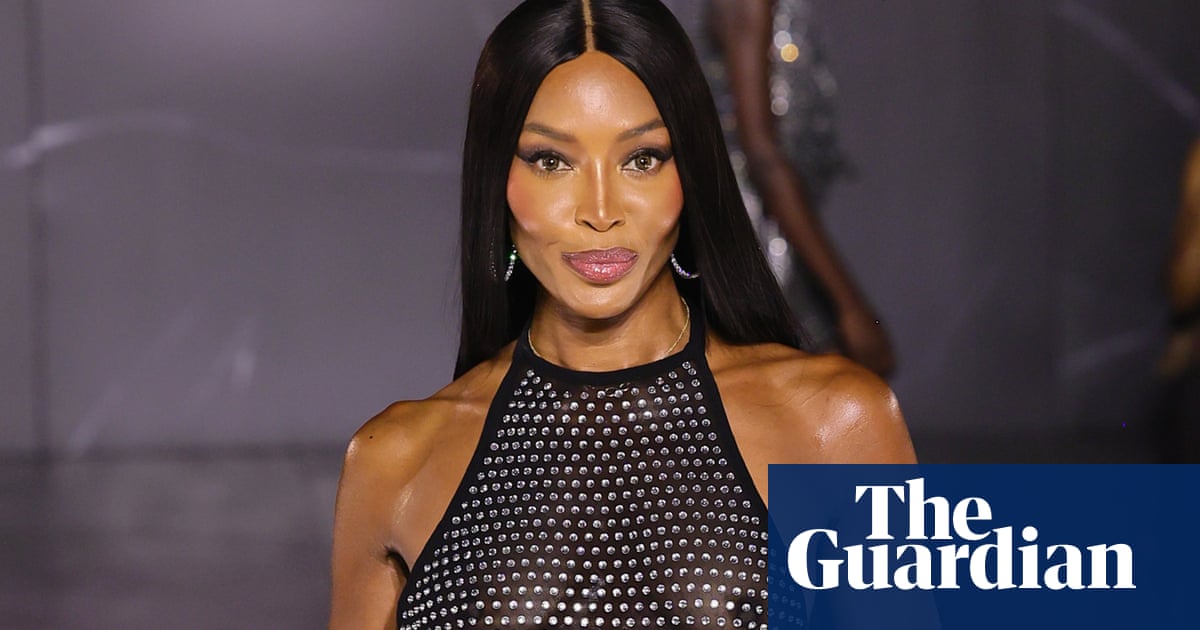Naomi Campbell has been reacquainting herself with London recently.
This week she’s been running about town on the underground, reliving the journey she used to take to school in Brixton, filming TikToks with content creators and putting in the hours promoting an exhibition at the V&A which chronicles her 40 years in fashion.
But for one of the most recognisable people in the industry, getting from A to B incognito can’t be easy? “Trust me, when I’m in London I get around,” she says. Key to going undetected is her walk – not the catwalk strut for which she is famous, but “a very sergeant major walk”. She goes to M&S, Waitrose and Harrods. “I’m very clear of where I’m going. And decisive. I’m not like dithering around like, ‘Oh, I’m lost.’ No, I know where I’m going.”
Does she still take the tube? “It’s been a minute. But truly, [there is] nothing faster. I used to get to Brixton in like 12 minutes.”
The life she has lived since those school runs on the Victoria line is one so full that the V&A has turned it into an exhibition – an honour usually reserved for designers and photographers, not models. Campbell, aware of the disparity in the way models are celebrated, says she hopes to see that change. “I can only hope that this may be the beginning. Models get overlooked in lots of things. They have all these award shows, but they overlook where the inspiration [comes from].”
The V&A’s exhibition is proof, as if more were needed, that Campbell is no ordinary model. Her career reads like a who’s who of not only fashion, but culture and politics over the last 40 years. As a child she appeared in the video for Bob Marley’s Is This Love and met him on set – “beautiful bone structure”. One of the original five supermodels, she has been a muse to designers from Gianni Versace to Azzedine Alaïa and was called an “honorary granddaughter” by Nelson Mandela.
In 1988, aged 18, she was the first Black model to appear on the cover of Paris Vogue and by 1989 she had become the first Black British model to front British Vogue and the first Black model to be on the cover of US Vogue’s all-important September issue.
Being a trailblazer is something Campbell is used to, but does she ever get tired of having to push open those doors? “I just move, I do what I do and I’m on to the next. I just want to always be doing the best that I can of myself.”
She has been working to improve equality in the industry since she was a teenager, joining the Black Girls Coalition in 1989, fronting the 2007 “black issue” of Vogue Italia, and campaigning for the Diversity Coalition since 2013 to champion diversity on the catwalk.
While progress in diversity of representation had been made in fashion – in no small part down to Campbell – she said in March that she worried “we are sliding back”.
“I’m still in that same position,” she said this week. “I will hold that thought until I see otherwise … I hold my breath.”
The exhibition, which opens on 22 June, will be split into sections and include “becoming Naomi”, which explores her childhood, her supermodel era, her relationship with Alaïa, the New York years when she shared a flat with fellow model Christy Turlington, collaborations with fashion houses from Vivienne Westwood to Jean Paul Gaultier and her advocacy work.
The show will draw on her extensive wardrobe as well as loans from designer archives, including a 1989 Thierry Mugler car-inspired corset, and Campbell’s look from Sarah Burton’s last Alexander McQueen show.
Through the very many highs, there have also been lows, some of which have made their way into the museum. At the more minor end, a pair of skyscraper Vivienne Westwood platforms worn by Campbell during her famous 1993 catwalk stumble, to the Dolce & Gabbana gown she wore on the final day of community service at the New York sanitation department, a punishment for throwing a phone at her maid.
“It’s part of my life,” she said. “I was open and I came out in my dress. I was very aware of what I was doing and I finished my week of community service. I fell on the runway. It happens. No one’s perfect. You know, when you fall, you pick yourself up and you keep going.”
As tickets went on sale, Campbell told the press she was “overwhelmed and stressed out”. She remains so: “You want everything to be right … For me, it’s celebrating the workmanship of all these amazing creators and designers I’ve worked with in my life.”
Her hopes for the exhibition are that people will “find out something they didn’t know about me”. Exactly what that is, she can’t say, but “it’s me, it’s my roots. I’m not forgetting and never will forget where I come from.”

